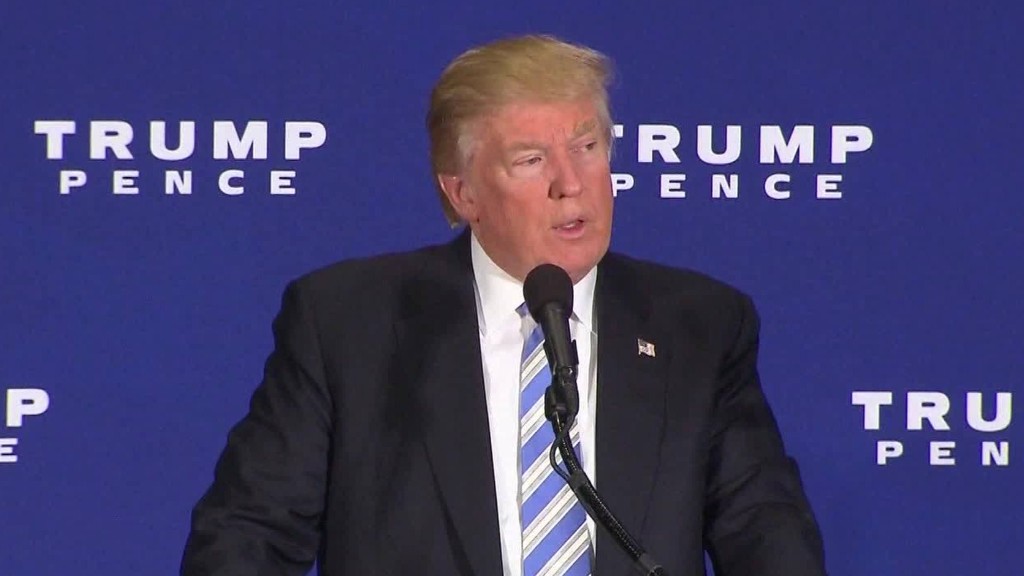
President-elect Donald Trump promised to bring jobs back to America's Rust Belt by getting tough on Mexico and China.
To do that, Trump threatens to use tariffs. His argument: if he makes doing business in China and Mexico too expensive, he'll convince companies to bring their jobs back to states like Ohio, Michigan and Indiana.
But tariffs won't bring jobs back to the key states that helped Trump win, expert say.
"Those jobs are gone and they're not coming back," says Edward Alden, a senior fellow at the Council on Foreign Relations. "Tariffs won't change that equation. Tariffs will make it worse."
Trump's economic adviser, Peter Navarro, emphasize that tariffs are more a threat than a first option in trade negotiations. Navarro said the tariffs can be used as a negotiating tool with Mexico and China to secure better trade terms. If they don't cooperate -- and China hasn't in the past -- Trump claims in his website that's when he'll apply tariffs.
Related: The future of global trade under Trump
When countries slap trade barriers on each other, that defines a trade war. And China, if not Mexico too, likely won't wait to retaliate with tariffs or sanctions of its own against America.
China "wouldn't take anything lying down, almost with guaranteed certainty," says Doug Irwin, a Dartmouth professor, who worked in Ronald Reagan's administration on trade.
To be clear, Trump can unilaterally hit Mexico and China with tariffs. He doesn't need input from Congress, especially under certain laws and circumstances that have broad interpretations.
The Constitution gives Congress the authority to use tariffs against other nations. However, a series of statutes enacted by Congress in the last 100 years have given the president power to use tariffs at his discretion.
For example, if Trump declares a "national emergency" over lost jobs, he can raise tariffs as high as he wants.
"Absolutely he can -- he has enormous powers," says Gary Hufbauer, senior fellow at Peterson Institute of International Economics, which outlined what Trump could do with trade. "He can impose tariffs."
Related: Mexican peso crashes to all-time low
But Hufbauer and other trade experts argue that tariffs won't bring jobs back.
More importantly, they will make things more expensive. All sorts of stuff -- from cars to clothes to electronics -- are mostly made abroad and companies don't pay a tax to bring them from China and Mexico to America. With a tariff, the price tag for many goods will go up dramatically.
And tariffs don't guarantee that the jobs in Mexico and China come back to America.
"It will encourage importers to switch to other countries -- Vietnam, Hong Kong, Malaysia," says Robert Scott, a trade economist at the Economic Policy Institute. Tariffs are "a very ineffective weapon. It would be very costly and it would not do a very good job of rebuilding manufacturing."
Trump's supporters believe the outcome will be different. Jock Buta runs Butech Bliss, a company that makes equipment for processing steel and employs 230 people in Salem, Ohio. He voted for Trump.
Buta realizes the risks of tariffs and believes Trump will need to put tariffs on more countries than just China and Mexico to bring jobs back. He's not convinced tariffs will make goods that much more expensive for Americans.
A trade war makes him nervous but says, "I don't know if that's the end of the world."
Related: Remember America's last trade war: Smoot-Hawley
"I know there's serious risks," says Buta, 46. "We have to be willing to take those risks...something needs to be done if we're going to grow and retain domestic jobs."
Three hours up the Rust Belt road from Buta is Alan Deardorff, a professor at the University of Michigan.
Deardorff hosted an event on Thursday about the future of a trade deal, the Trans-Pacific Partnership. The event had been scheduled before Trump won, and Deardorff saw the futility of it since a Trump win meant that TPP was likely dead.
But the possibility of a Trump trade war is very much alive.
"He has talked about doing things that would cause a trade war," says Deardorff. "Absolutely -- the possibility has been heightened."


